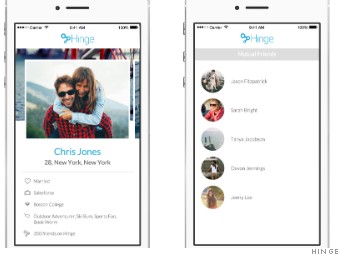

“If you imagine the amount of extra time that it takes to add any piece of information to your profile, it’s already a friction point. A slow build, but one Michelle Parsons, Hinge’s CPO, interprets as encouraging. The company tells me 13 percent of new daters on the app build their profile with a voice prompt and that 46 percent of people on the app have listened to at least one voice prompt. I reached out to Hinge to get more concrete data on how this feature is performing and whether going viral was part of the plan. NBC News wrote about the viral fad a couple weeks ago, which you can read here. There’s impersonations, singing, sincerity, and bizarre moments. The prompts have gone viral on TikTok and Twitter, with people reposting them either because they’re funny, cringe-worthy, or something in between. Each clip can be 30 seconds, and, at launch, Hinge said two out of three daters it polled thought voice would help them “better determine their chemistry” with someone.įast forward to now, and, well, voice prompts are certainly doing something. Instead of telling potential matches about yourself with text, you could do so with your voice. The first: Last month, the dating app Hinge debuted voice prompts to daters’ profiles. Today’s main story is one best told in a couple parts. Lots! Of! Stuff(ing)! On we go.ĮXCLUSIVE: Hinge makes viral audio happen, despite many other apps trying
Hinge dating app data update#
Plus, an update to my RadioPublic story from last week and new Apple charts. We’re talking about how a dating app stumbled upon viral audio success, and I chatted with the CEO of podcasting’s latest $100 million-funded company, Podimo. I’m back for you now, though, and we have a big issue ahead.

Anyway, in between mashed potato servings, I did my best to “log off” and not think about audio - no offense - so instead, I binged the entire new season of Selling Sunset and played many crosswords. I can stop, but I won’t stop until the leftovers are gone. Really, I’ve eaten mashed potatoes five days in a row. Other dating apps looking to secure user trust may want to emulate such protective steps in the name of user safety and ultimately, brand loyalty.Hello! I’m back from Thanksgiving break and now have mashed potatoes for brains.

Some companies are preparing by building up safety measures on their respective apps. The number of dating app consumers may continue to climb in the coming years. However, many dating apps have been hesitant to promote disease control, believing that doing so could tarnish their image, according to UCLA health researcher Jeffrey Klausner. A handful of dating apps have encouraged users to disclose their HIV status, while also encouraging users to get tested and treated. Some dating apps have secured trust, including The League, which requires users to be fully verified on Facebook and Linkedin in addition to paying to use its services.įurthermore, many in public health fields have raised concerns over the rise of sexually transmitted diseases across the United States, in part due to unregulated app usage. A Gartner report found that as government regulations become stricter, companies will have to rethink approaches to data collection in order to retain user trust. However, following the Cambridge Analytica scandal, many apps have been allowing new users to create profiles independently from the social network.

Many dating apps, including those owned by Match Group-the largest dating app conglomerate-often rely on Facebook to “verify” a user’s profile. A ProPublica report from December 2019 interviewed users who went on dates with registered sex offenders they met through dating apps, but had no idea due to the app’s lack of user authentification. While some do not add a last name for safety, others refrain from adding a surname to avoid detection of a criminal record.
Hinge dating app data full#
Users can often choose whether to put their full name into a profile. One of the main concerns stems from the lack of background checks required to use most dating apps. As dating apps rise in recognition, users–both current and potential–are voicing concerns over the safety of these platforms. With 33.9 million people using dating apps in 2019, apps like Tinder, Hinge, and OKCupid have become staples in modern culture. Are dating app users putting themselves at risk?


 0 kommentar(er)
0 kommentar(er)
